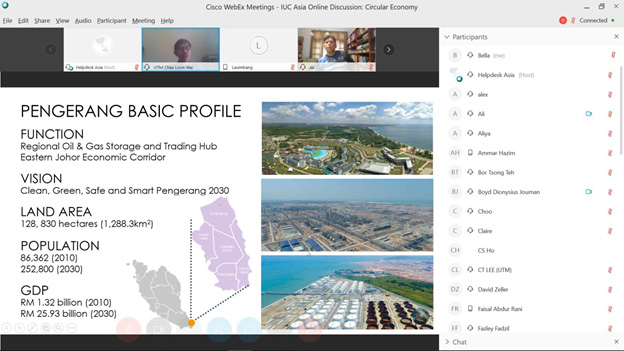THE impact of climate change has raised the awareness of local leaders to take actions on local level. Appointed as the Southeast Asia Secretariat of Global Covenant of Mayor (GCoM), UCLG ASPAC has committed to support cities and optimise their capacity to respond to this global issue under the framework of IUC Asia Programme supported by the European Union (EU). During the time of COVID-19 global pandemic, IUC Asia continues supporting to local leaders through various discussions focusing on climate change mitigation and circular economy.
17 March 2020 | UCLG ASPAC, through IUC Asia programme, organised a webinar entitled “Designing Cities’ Mitigation Action Plan on Climate Change.” In the discussion, a representative of the Centre for Climate Risk and Opportunity Management (CCROM), IUC Asia’s technical partner, presented the general concept of climate change mitigation and the steps to best develop a mitigation action plan for local authorities. The discussion also provided room for cities to share their experiences in implementing their mitigation plan and its impact. Palembang shared the process of developing GHG inventory with support from IUC Asia. Jakarta elaborated the city’s efforts to reach 30% GHG reduction in 2030. Pangkal Pinang also shared their experience in algae farming to reduce the city’s GHG as part of city’s climate action plan. This online discussion garnered 46 participants representing 12 Indonesian cities, including five pilot cities of IUC Asia Programme namely Palembang, Depok, Malang, Denpasar, and Makassar. Also attending the webinar were Tangerang, Semarang, Balikpapan, Samarinda, Gorontalo, Jakarta and Pangkal Pinang, together with representatives of several state universities across Indonesia.
2 April 2020 | Discussion on Circular Economy was chosen as a focus of the webinar. In collaboration with Universiti Teknologi Malaysia (UTM), IUC Asia explored urban practices in implementing this model. This webinar introduced the basic concept of circular economy as a model that designs out waste and pollution, keeps products and materials in use to its maximum capacity as long as possible, and regenerates natural systems. The principles are applied in various steps constituting a whole cycle of production and consumption, including through recycling, remanufacturing, redistributing, sharing, and repairing. In the discussion, participants shared their practices on circular economy activities, elaborated the challenges and lessons learned, and suggested recommendations. UTM elaborated the case of Pengerang Municipality that adopts circular economy as a framework for low carbon industrial port city and focuses on decarbonising industries through sustainable resource management and integration, industrial waste management and recovery, as well as sustainable industrial management and practice. Metropolitan City of Bologna also introduced its strategic plan that consists of key projects applying the circular economy model, such as Circular Economy for Small and Medium Enterprises (CE-SME), SMEs Circular Economy in the Agri-Food sector (SinCE AFC), and Green Start-up Support (GRESS).











